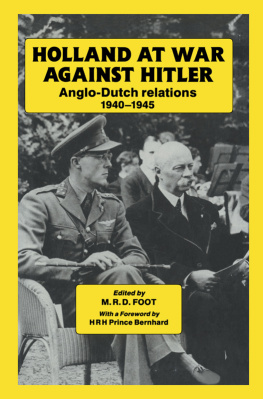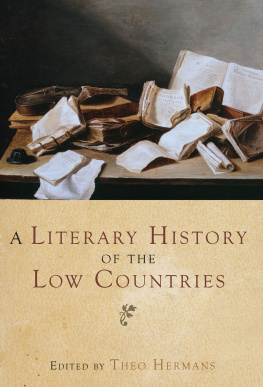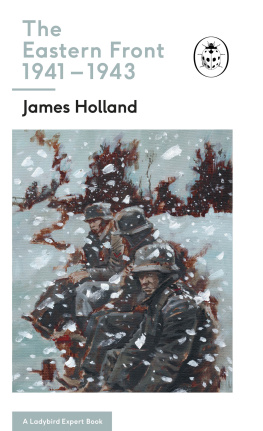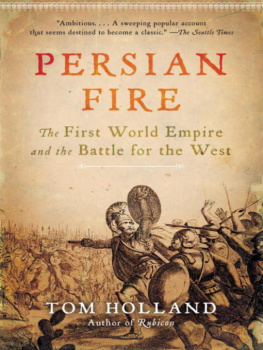Cover
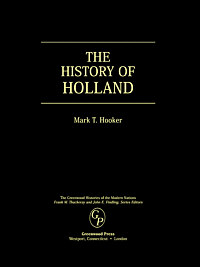
| title | : | The History of Holland Greenwood Histories of the Modern Nations, 1096-2905 |
| author | : | Hooker, Mark T. |
| publisher | : | Greenwood Publishing Group |
| isbn10 | asin | : | 0313306583 |
| print isbn13 | : | 9780313306587 |
| ebook isbn13 | : | 9780313050688 |
| language | : | English |
| subject | Netherlands--History. |
| publication date | : | 1999 |
| lcc | : | DJ111.H66 1999eb |
| ddc | : | 949.2 |
| subject | : | Netherlands--History. |
Page i
THE HISTORY OF HOLLAND
Page ii
ADVISORY BOARD
John T. Alexander
Professor of History and Russian and European Studies, University of Kansas
William B. Cohen
Professor of History, Indiana University, Bloomington
Robert A. Divine
George W. Littlefield Professor in American History Emeritus, University of Texas at Austin
John V. Lombardi
Professor of History, University of Florida
Page iii
THE HISTORY OF HOLLAND
Mark T. Hooker
The Greenwood Histories of the Modern Nations
Frank W. Thackeray and John E. Findling, Series Editors

Greenwood Press
Westport, Connecticut London
Page iv
Library of Congress Cataloging-in-Publication Data
Hooker, Mark T.
The history of Holland / Mark T. Hooker.
p. cm.(The Greenwood histories of the modern nations,
ISSN 10962905)
Includes bibliographical references and index.
ISBN 0313306583 (alk. paper)
1. NetherlandsHistory. I. Title. II. Series.
DJ111.H66 1999
949.2dc21 9851895
British Library Cataloguing in Publication Data is available.
Copyright 1999 by Mark T. Hooker
All rights reserved. No portion of this book may be
reproduced, by any process or technique, without the
express written consent of the publisher.
Library of Congress Catalog Card Number: 9851895
ISBN: 0-313-30658-3
ISSN: 10962905
First published in 1999
Greenwood Press, 88 Post Road West, Westport, CT 06881
An imprint of Greenwood Publishing Group, Inc.
www.greenwood.com
Printed in the United States of America

The paper used in this book complies with the
Permanent Paper Standard issued by the National
Information Standards Organization (Z39.481984).
10 9 8 7 6 5 4 3 2 1
Page v
My great thanks to
Anne Jacobs-Otten,
who read the manuscript and
made innumerable valuable suggestions
My appreciation to
Frank Thackeray and John Findling
for providing me the opportunity
to participate in this project
And my special thanks to
my wife, Stellaborn and raised
in The Haguewho is the inspiration
for my interest in
Holland and things Dutch
Page vi
This page intentionally left blank.
Page vii
Contents
Series Foreword byFrank W. ThackerayandJohn E. Findling | ix |
Timeline of Historical Events | xiii |
Abbreviations | xix |
Part I
The Contemporary Nation: An Overview | |
| Geography | |
| The Economy | |
| The Political System | |
| Society | |
Part II
The History of the Nation | |
| From the Ice Age to the Middle Ages | |
Page viii
| Reformation, Rebellion, and the Republic | |
| The Union and the Golden Age | |
| The Colonies | |
| Constitutional Democracy | |
| War, Crisis, and Recovery | |
| The Rise and Fall of the Welfare State | |
| The New Society: The Pillars Collapse | |
| The New PostCold War World | |
Notable People in the History of Holland | |
Appendix: Dutch Print Media Companies | |
Bibliographic Essay | |
Bibliography of Translations of Works by Twentieth-Century Dutch Authors | |
Index | |
Page ix
Series Foreword
The Greenwood Histories of the Modern Nations series is intended to provide students and interested laypeople with up-to-date, concise, and analytical histories of many of the nations of the contemporary world. Not since the 1960s has there been a systematic attempt to publish a series of national histories, and, as series editors, we believe that this series will prove to be a valuable contribution to our understanding of other countries in our increasingly interdependent world.
Over thirty years ago, at the end of the 1960s, the Cold War was an accepted reality of global politics, the process of decolonization was still in progress, the idea of a unified Europe with a single currency was unheard of, the United States was mired in a war in Vietnam, and the economic boom of Asia was still years in the future. Richard Nixon was president of the United States, Mao Tse-tung (not yet Mao Zedong) ruled China, Leonid Brezhnev guided the Soviet Union, and Harold Wilson was prime minister of the United Kingdom. Authoritarian dictators still ruled most of Latin America, the Middle East was reeling in the wake of the Six-Day War, and Shah Reza Pahlavi was at the height of his power in Iran. Clearly, the past thirty years have been witness to a great deal of historical change, and it is to this change that this series is primarily addressed.
Page x
With the help of a distinguished advisory board, we have selected nations whose political, economic, and social affairs mark them as among the most important in the waning years of the twentieth century, and for each nation we have found an author who is recognized as specialist in the history of that nation. These authors have worked most cooperatively with us and with Greenwood Press to produce volumes that reflect current research on their nation and that are interesting and informative to their prospective readers.
The importance of a series such as this cannot be underestimated. As a superpower whose influence is felt all over the world, the United States can claim a special relationship with almost every other nation. Yet many Americans know very little about the histories of the nations with which the United States relates. How did they get to be the way they are? What kind of political systems have evolved there? What kind of influence do they have in their own region? What are the dominant political, religious, and cultural forces that move their leaders? These and many other questions are answered in the volumes of this series.
Next page

